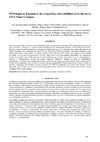Please use this identifier to cite or link to this item:
https://accedacris.ulpgc.es/jspui/handle/10553/58093
| DC Field | Value | Language |
|---|---|---|
| dc.contributor.author | Santoyo-Ramón, José Antonio | en_US |
| dc.contributor.author | Fortes, Sergio | en_US |
| dc.contributor.author | Mora-García, Rocío | en_US |
| dc.contributor.author | Baena, Eduardo | en_US |
| dc.contributor.author | Medina, Miguel | en_US |
| dc.contributor.author | Mora, Patricia | en_US |
| dc.contributor.author | Barco, Raquel | en_US |
| dc.date.accessioned | 2019-11-26T13:53:22Z | - |
| dc.date.available | 2019-11-26T13:53:22Z | - |
| dc.date.issued | 2019 | en_US |
| dc.identifier.isbn | 978-84-09-14325-2 | en_US |
| dc.identifier.uri | https://accedacris.ulpgc.es/handle/10553/58093 | - |
| dc.description.abstract | Smart-city approaches are key for current information and communications technology (ICT) deployments in towns and cities, having as a main goal to improve health, sustainability and management of public services and infrastructures. However, real-world deployments based on Internet-of-Things (IoT) and ICT technologies are usually difficulted by the public inertia and cost to implement them in a wide city. Conversely, university campuses represent by themselves large areas populated by a huge number of students, professors and university staff. In this way, campuses have multiple advantages for real smart-city deployments over other urban areas. Firstly, the campuses “population” and management entities are typically, due to their involvement with technology and research, more prone to act as “early-adopters”, allowing to experimentally oriented and quickly deployed “smart-city” services (in terms of sustainability, management…). Secondly, the teaching and research activities in the campus can highly benefit for the involvement of the university community in the activities associated with the implementation of these approaches in terms of hands-on practices, technology-familiarization, courses, research, etc. With this approach, the present work deepens on the approaches, infrastructure, research and educational programs and their results of the smart-city initiative of the University of Málaga (UMA Smart-Campus). | en_US |
| dc.language | spa | en_US |
| dc.source | VI Jornadas Iberoamericanas de Innovación Educativa en el Ámbito de las TIC y las TAC, Las Palmas de Gran Canaria, 14 y 15 de noviembre de 2019, p. 285-292 | en_US |
| dc.subject | 58 Pedagogía | en_US |
| dc.subject | 530602 Innovación tecnológica | en_US |
| dc.subject.other | Smart-Campus | en_US |
| dc.subject.other | University | en_US |
| dc.subject.other | ICT | en_US |
| dc.subject.other | Sustainability | en_US |
| dc.subject.other | Education | en_US |
| dc.subject.other | Innovation | en_US |
| dc.subject.other | R&D&i | en_US |
| dc.title | El Enfoque de enseñanza, investigación y sostenibilidad de la Iniciativa UMA Smart-Campus | en_US |
| dc.type | info:eu-repo/semantics/conferenceObject | en_US |
| dc.type | ConferenceObject | en_US |
| dc.relation.conference | VI Jornadas Iberoamericanas de Innovación Educativa en el Ámbito de las TIC y las TAC (InnoEducaTIC 2019) | en_US |
| dc.investigacion | Ingeniería y Arquitectura | en_US |
| dc.type2 | Actas de congresos | en_US |
| dc.identifier.ulpgc | Sí | es |
| item.grantfulltext | open | - |
| item.fulltext | Con texto completo | - |
| crisitem.event.eventsstartdate | 14-11-2019 | - |
| crisitem.event.eventsenddate | 15-11-2019 | - |
| Appears in Collections: | Actas de congresos | |
Page view(s)
287
checked on Mar 1, 2025
Download(s)
384
checked on Mar 1, 2025
Google ScholarTM
Check
Altmetric
Share
Export metadata
Items in accedaCRIS are protected by copyright, with all rights reserved, unless otherwise indicated.
